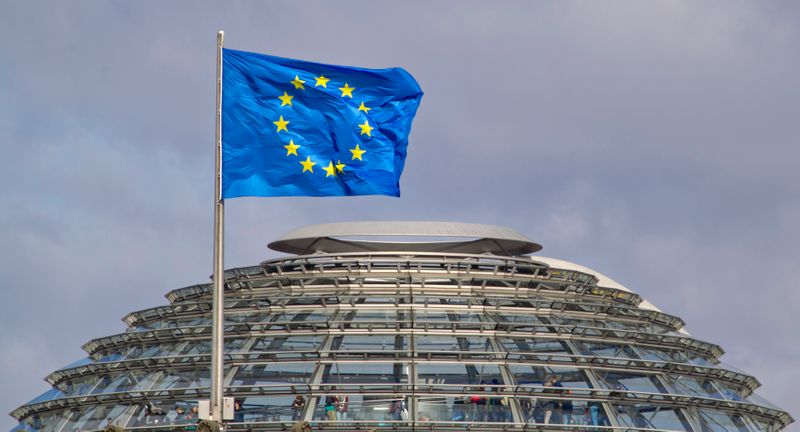By Mike Dolan
LONDON (Reuters) - As German opinion polls shift dramatically from Green to conservative ahead of September's elections, the prospect of a post-pandemic rethink of euro zone fiscal policy and debt funding dims with them.
Just six week ago, the chances of a first Green Party Chancellor were very real indeed, judging by huge poll ratings for Green candidate Annalena Baerbock. And it was widely touted in financial markets as a potentially seismic moment in German domestic and European economic policy.
But polls have flipped back since to Angela Merkel's CDU conservatives and their sister CSU party. With Merkel stepping down, the alliance led by candidate Armin Laschet has moved ahead in all nine surveys published in June so far - a lead widening to a latest of almost 10 points.
A series of gaffes and missteps by Baerbock have been blamed by local pundits, while online prediction markets betting on the next Chancellor have ballooned in favour of Laschet.
In the light of that resurgence, Monday's conservative manifesto was for many a bucket of cold water over hopes the euro zone could move to a looser fiscal setting and more integrated funding stance once the pandemic finally passes.
Criticised domestically for pitching seemingly unfunded tax relief for high earners, the plans demand a return of Germany's constitutional "debt brake" - limiting structural deficits to 0.35% of gross domestic product - and a goal of getting debt/GDP back below 60% from this year's pandemic-related blowout of 70%.
Reform of euro zone fiscal rules were flatly dismissed. The manifesto seeks a return to status quo ante and to "swiftly reinstate" the Stability and Growth Pact (SGP) suspended during the fight against COVID-19.
It also insists the 800 billion euros ($955 billion) of EU-wide funding for the post-pandemic Recovery Fund is a one off and not the start of a "debt union."
While none of it is a radical departure from existing conservative thinking, it stokes fresh fears of a return to euro austerity policies that many blame for the paltry and spluttering economic rebound in the euro area after the banking crash and sovereign debt shock of the past decade.
They also douse down Green party proposals such as reform of the SGP and making the EU recovery fund a permanent part of the EU budget to invest in a "green transition".
'RECIPE FOR DISASTER'
Some economists see it as less of a return to normal than a step into the dark.
"Laschet's plea for a return to pre-pandemic fiscal rules is a recipe for disaster - pushing for slower recovery, divergence and euro zone breakup down the road," said Philipp Heimberger at The Vienna Institute for International Economic Studies.
All good reasons for investors to sit up and take notice.
Even if markets have been obsessed of late with the runes of U.S. Federal Reserve signalling or Washington's big spending push, the German hustings have potentially profound implications for the future of the euro, cohesiveness with the bloc and another mammoth task ahead for the European Central Bank.
"The CDU manifesto gives an opening for more fiscal flexibility and hence stimulus at the national level - but hardly any at the eurozone level," concludes ING's Global Head of Macro Carsten Brzeski, talking of a "Germany First" investment agenda that's "bad news for euro federalists."
Brzeski cautions about over-hasty reading of the polls, however, and still sees a CDU/Green coalition as one of the most likely outcomes of the election. Even if a Green Chancellor seems less likely, he points out that German voting intentions appear more fluid and prone to larger swings than normal.
Merkel said on Tuesday that Germany may need to spend "gigantic" sums on hi-tech industry and cleaner energy over the years ahead and some state aid would be needed. But she stuck to the party line by saying that was the reason public finances needed to be brought back in check now.
If that sort of fiscal restraint overrides any Green fiscal and investment rethink after September, the drag on German and euro zone growth potential will underline what ECB President Christine Lagarde described on Monday as the "different situation" between the United States and the euro zone.

As such, it doesn't bode well for the prospect of positive German government bond yields or a sustained euro currency rise over time.
($1 = 0.8379 euros)
(by Mike Dolan, Twitter: @reutersMikeD; Editing by Mark Potter)